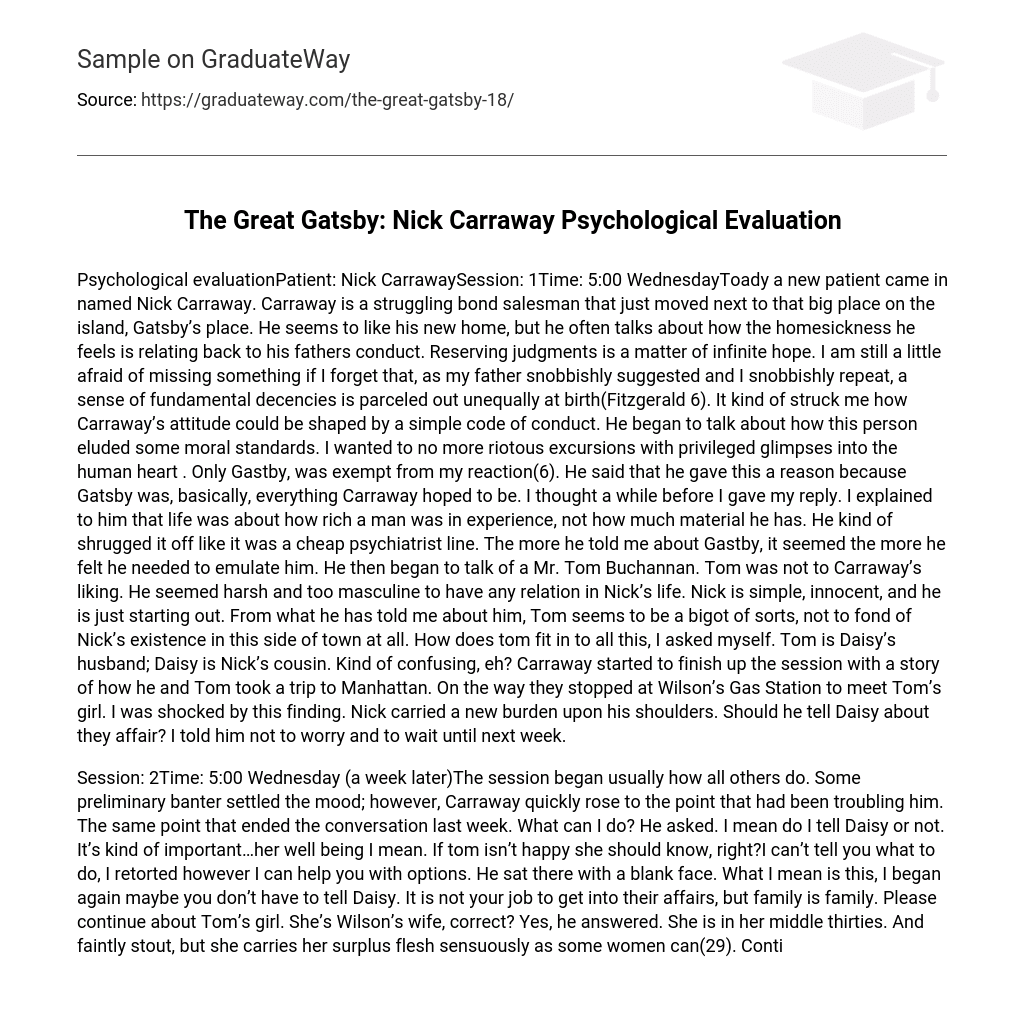A new patient, named Nick Carraway, arrived today. Carraway is a struggling bond salesman who recently moved next to Gatsby’s large residence on the island. Although he seems to enjoy his new home, he frequently mentions feeling homesick and attributes it to his father’s behavior. Viewing others without prejudice represents a boundless optimism. I still have some fears of overlooking something if I disregard the notion that, as my father haughtily suggested and I haughtily reiterate, a sense of basic morality is distributed unequally at birth. It struck me how Carraway’s perspective could be influenced by a simple code of conduct. He began discussing how someone managed to evade certain moral standards. I wanted to experience no more wild escapades that offer fleeting insight into the depths of the human soul. Only Gatsby was immune to my reaction.
He mentioned that he admired Gatsby because Gatsby possessed qualities and accomplishments that Carraway aspired to have. After thinking for a while, I explained to him that life should be valued based on experiences rather than material possessions. He seemed dismissive, treating my explanation as a cliché line from a therapist. As he shared more about Gatsby, it became clear that Carraway felt compelled to imitate him. He also talked about a person named Mr. Tom Buchannan who Carraway disliked. Carraway saw Tom as harsh and overly masculine, with no connection to his own life. Carraway is simple, innocent, and at the beginning stages of his journey. Based on Carraway’s account, it seems like Tom is somewhat intolerant and disapproving of Carraway’s existence in this part of town. I questioned how Tom fits into all of this, only to find out that Tom is Daisy’s husband and Nick’s cousin – confusing, right? To conclude our discussion, Carraway recounted a story about him and Tom going on a trip to Manhattan.
While on their way, they stopped at Wilson’s Gas Station to meet Tom’s girl, which surprised me. This discovery added more weight on Nick’s shoulders – should he tell Daisy about their affair? I advised him not to worry and suggested waiting until the following week. The session started like previous ones, with some small talk to set the mood. However, Carraway quickly brought up the issue that had been troubling him – the same matter that concluded last week’s discussion.
He asked, “What should I do? Should I tell Daisy or not? It’s very important… her well-being, I mean. If Tom is unhappy, she deserves to know, right?”
I replied, “I can’t make that decision for you; however, I can help you explore different options.” He sat there expressionless. “What I’m trying to say is this,” I continued, “maybe it’s not necessary for you to tell Daisy about this information. It’s not your responsibility to involve yourself in their affairs; however, family is family.”
Please continue discussing Tom’s girl.
Confirmed by Wilson, she is his wife. She is in her mid-thirties and slightly overweight, but possesses a sensual manner of carrying her excess flesh. Moving forward, her name is Myrtle. Tom needs help understanding his actions towards Daisy, whom he is supposed to love. According to your information, Tom is the type of person who does what’s necessary when it’s right. He affirmed this. However, on the same day, he also broke Myrtle’s nose. I asked Carraway about his relationship with Gatsby; he said it hadn’t really changed. The parties became more frequent as time passed (two weeks later). Nick appeared more troubled than before and shared that Gatsby had greatly disappointed him – the man who held his hopes and dreams was a bootlegger named Gatsby. During that time, many people were involved in bootlegging (although I don’t support their actions), which was the prevailing trend at that time as I explained to him. Rumors circulated that Gatsby had committed murder at some point (65). Nick was skeptical about Gatsby claiming to be an Oxford graduate as well. Additionally, Gatsby received the Medal of Valor for his World War One service. All this helped calm Nick down somewhat as he began focusing on the positive rather than dwelling on the negative.
He then informed me about the desperate fight Gatsby was engaged in for Daisy. The situation had escalated to the point where Gatsby requested a tea party to be organized, hoping to coincidentally encounter Daisy. Gatsby’s feelings had grown so intense that he even dismissed his staff to have more time to pursue Daisy. He shared with me the tragic news of Myrtle’s death, leaving me dumbfounded. That explained why I had taken a week off. Gatsby elaborated on how this event sparked a new conflict between him and Tom. Amidst the constant parties and trips to the city, Carraway was unsure of what to make of his own life. I reassured him that everything would become clear eventually. This was just a storm, and eventually, the clouds would part and reveal that all of this was happening for a greater purpose.
Session: 4
Time: The next day.
I was awakened by a fretted call.
Carraway was torn and devoid of faith. I advised him to come down once. He obeyed and informed me about Gatsby’s demise. Wilson, Myrtle’s spouse, murdered Gatsby and then committed suicide. Tom told him that Gatsby had an affair with Myrtle, resulting in Wilson killing Gatsby. Daisy returned to Tom and things resumed their previous state. The frequency of parties decreased.
Nick began to sober up and realized that the society surrounding him wasn’t what he desired; however, it fascinated him so much that he couldn’t bear not being a part of it. It was a “can’t live with it, can’t live without it” situation.
Carraway came to understand that dreams exist in the eye of the beholder and hope serves as the lens through which those eyes perceive the dream.
English Essays





